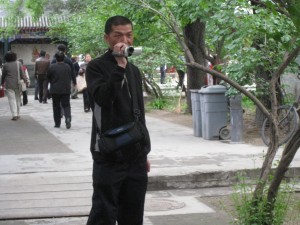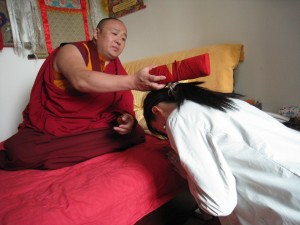Sunday
Community ArticlesShambhala in Neverland
 For the past four years I have resided part time in mainland China, living in the concrete and tin roof barracks of the artist’s villages that ring the northeast section of Beijing, by the Fifth Ring Road near the airport. Personal voice and uncensored expression are core to my outlook, so it‘s really a challenge when I have to, in a softly layered way, cover up or gloss over the fact that I am a practicing tantric Shambhala Buddhist. It’s not that I am trying to be secret or people don’t know, it’s just there is not much I can say about it when the topic does come up. As a foreigner I am more privileged than most, but even with that kind of privilege, group meditation can only take place in one’s home and usually only with other foreigners.
For the past four years I have resided part time in mainland China, living in the concrete and tin roof barracks of the artist’s villages that ring the northeast section of Beijing, by the Fifth Ring Road near the airport. Personal voice and uncensored expression are core to my outlook, so it‘s really a challenge when I have to, in a softly layered way, cover up or gloss over the fact that I am a practicing tantric Shambhala Buddhist. It’s not that I am trying to be secret or people don’t know, it’s just there is not much I can say about it when the topic does come up. As a foreigner I am more privileged than most, but even with that kind of privilege, group meditation can only take place in one’s home and usually only with other foreigners.
The Internet is deeply filtered, Skype is monitored and stored on Tom Servers inside China, news is censored, and text messages scrutinized using the most advanced American technology. When you live in the mainland you know this comes with the territory but it’s interesting to see the effect it has upon one’s outlook. To openly challenge things as they are would lead to revoked or denied visas. To openly lead classes and workshops in meditation could result in the same actions. In other words, Shambhala level “O” is not an option.
Over time I have met quite a number of “secret” Chinese Buddhists, and as I write this I know somewhere in cyberspace one or more of the 100,000 plus human internet censors China employs will be reading this post, putting it on a banned list and probably making sure no one in the mainland can read what I am about to write. But then again, that depends on the keywords I use, the overt terminology and the proclivities and interest of that particular censor on that particular day. I am even taking a very mild risk concerning my own comings and goings to post this.
When I drink liquor with artists at group meals they weep and pull out crumpled photos of the 17th Karmapa hidden in the back recesses of their wallets. I don’t know if the tears have to do with their sentiments or with how smashingly drunk they are. They speak in Chinglish, sometimes someone translates but we never get into anything deeper than a well intentioned slap on the back. Lamas do come through town and I have gone to individual student’s apartments and witnessed the lamas recite mantras, give advice, and bless their students on the head bomping them with cloth wrapped Tibetan texts. These students are fueled on faith alone, because not one of them to the best of my knowledge has had any intellectual or mind training or meditation practice experience beyond lighting candles every morning on their shrine and perhaps reciting some mantras.
One has to refrain from judgments to try and explain that pouring a cup of water over a statue of a baby Buddha for the Buddha’s Birthday is not all there is to practice. It seems like pure hubris because of the restricted context at the Beijing temple, which is under surveillance and constantly and openly filmed by Chinese undercover security police. All I can do is pour water over the statue as well. No lectures to my friends suffice and neither does criticism. Only being a simple person with no reference point succeeds. Only being completely and utterly natural without isms of history and credentials works. It is impossible to explain to them the intricacies of the initiations I have received, so I don’t. My Chinese friends ask, “Are you a Buddhist?” I say yes and leave it at that. They don’t inquire further and I don’t offer. We just go out for noodles and beer.
Some people reading this might be upset with my passivity and feel I should contribute more. But that, I fear is evangelizing, something that is not very Shambhalian. Manifesting brilliance and sanity and presence is very Shambalian and doing so without reference point is the point. No one knows, no one cares and you are who you are, warts and all. The only difference perhaps is a sense of relaxation and humor.
From my perspective the huge rush towards materialism is going to catch up with the Chinese in the near future and they will hit a wall. I already see it happening. There is a young group of 25 year olds from one Wuhan, one of the outer provinces called the “Waza Group.” They make bleak, boring experimental films that induce ennui. It’s a stance best fermented amongst post World War II French intellectuals, not hip young skateboarding Chinese. Yet the root cause is the same, a spiritual vacuum that opens up when faith in one system vanishes and there is utterly nothing to replace it.
China has a vast spiritual history that includes Taoism, Buddhism, and Confucianism. The question is how can the Chinese tap into it? I don’t see that happening quickly since a top down strategy of government is locked in place though there is a lot of back door maneuvering going on to allow certain talks and conferences on the Buddhism to move forward. A one-party system, it heavily rewards the use of suppression with the same fervor we reward the pay of bank CEO’s who steer their businesses into bankruptcy – lavishly and inverse to their job’s actual effectiveness in society at large.
So living part of the time in my version of Neverland, where you can’t talk about Shambhala or other practices and all you can do is manifest them in coded “Neverland speak” that alludes to but never directly points at dharma is challenging, and ultimately rewarding. For that you must manifest constantly without either reference point, dogma or title. And that is my idea of Shambhala Warriorship.






Mar 2, 2009
Reply
As a friend, a good friend, of Ellen Pearlman’s, I have to confess being slightly shocked to hear this. In light of the fact that most phone calls, letters, faxes and emails to America originating abroad are subject to government surveillance, not to mention domestic surveillance, extraordinary rendition, virtually unlimited access to US phone company records, library records, I feel that this article is more like “the lady doth protest too much.”
I’ve lived here for 17 years and every single government contact we have knows right up in front that I’m a practicing Buddhist and that the reason I started Surmang Foundation and now amara fnd., is because of my connection to my teacher, Chogyam Trungpa. If I can say so, without arrogance, in all candor, I’ve gotten a lot of respect for what we do in China based on just that. It adds credibility. In 1987 the Governor of Qinghai praised our work for fulfilling the vision of Chogyam Trungpa.
And I also respect a kind of spirituality here that is easily missed if you end up comparing the place to West Covina.
We’ve had many Buddhist dharma study groups here over the years. Yes it is true that there is no freedom of religion here the way there is in the US or Canada. I appreciate that, having taken succor from that freedom for 47 years when I lived in the States. However: want to practice Scientology in Germany? Buddhism in Greece, the birthplace of Western democracy?
When Ellen finds spiritual materialism, the way Buddhadharma is related mainly to acquiring merit here, is not only a mark of Chinese Buddhism, it is also the main also mark of Tibetan, Vietnamese, Japanese, Cambodian and Thai Buddhism, as I’ve seen in my travels. It’s what Shibata Sensei calls “gimme gimme Buddhism.”
So to be shocked that that is the case is more of lack of cultural sensitivity than anything connected to dharma. In fact with the results-oriented teachings of Sakyong as reflected in his daily posted teachings, and the various mo’s, Jambhala relics, practices available from the Ripa family, I can only think of what a boss of mine used to say in assigning blame: when you point the finger at someone, three fingers are pointed back at you.
I think that we as budding bodhisattvas have to be careful about judging that we have it and someone else does not. Or as Tai Situ Rinpoche advised me in 1986 before my first trip to Tibet, “overestimation of self and underestimation of other is a big mistake.”
Don’t get me wrong — this isn’t a political screed, and I’m not exonerating any political system or position. I just feel a kind of jingoism in this piece that doesn’t at all grok with my experience here. Maybe Ellen, you should study Chinese language and traditional culture; see what happens. You might change your mind — you are a very open-minded person. It’s hard to compare the scene here with New York, unless you stay here long enough to really see it. I’m no expert, as I’m constantly reminded. I’m married to a Chinese woman, 1/2 half my family is Chinese and I don’t doubt that Buddhism is part of the warp and woof of the culture. I find the people to be mostly kind, not speedy, willing to cheer up at a moment’s notice, and extremely generous.
Are they in samsara? To paraphrase Jamgon Kongtrol in 1980, “I thought you knew that already.”
Without the cooperation of our Chinese friends in and out of the government, our philanthropic work would be impossible. I’d like to see a more nuanced piece about China; it’s a big country.
Lee